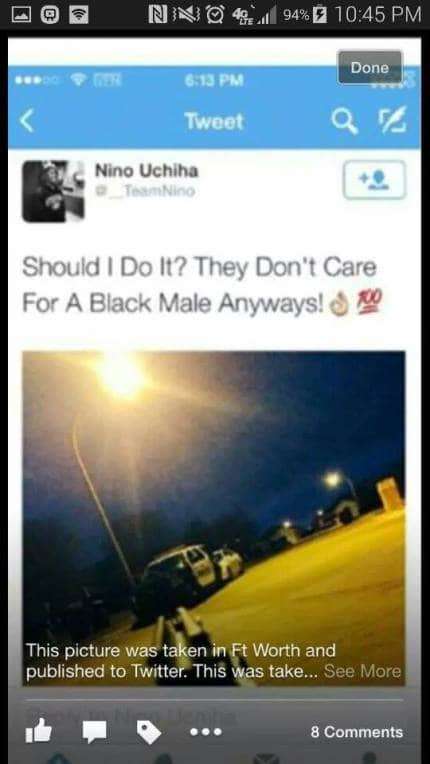The Volokh Conspiracy
Mostly law professors | Sometimes contrarian | Often libertarian | Always independent
"Should I Do It? They Don't Care For A Black Man Anyways!" + photo of replica gun pointed at police car = arrest

AP and CBS Dallas-Fort Worth have the story; AP confirms that the gun was fake, and that a nearby tweet on the same account stated that it was fake (for whatever that's worth).
As I've written before as to the Charles DiRosa / "Put Wings on Pigs" post, such speech is likely protected by the First Amendment, unless there are more facts that aren't being reported. It isn't punishable incitement of crime - to fit within the incitement exception, speech must be intended to and likely to produce imminent unlawful conduct, as opposed to just being "advocacy of illegal action at some indefinite future time." See Hess v. Indiana (1973) and Brandenburg v. Ohio (1969). And this post, even if it is intended as advocacy of murder, is indeed advocacy of murder at some indefinite future time (as opposed to in the coming hours).
Nor is it likely to be a punishable "true threat." Even if one treats the statement not as a question but as an implied statement that the speaker likely will do this, such general statements, with no specificity of victim, place, or time, are not punishable threats.
An analogy might be someone posting a photo of a gun pointed at a supposed illegal alien - who doesn't see the gun when the photo is taken, and who isn't identifiable from the photo, so there's no particularized threat - with a caption, "Should I do it? The government isn't enforcing illegal immigration laws, so we might as well just shoot them." Reprehensible, but constitutionally protected speech, and not within the "true threats" exception to First Amendment protection.
The police have ample authority to investigate people who say such things, and see whether such speakers are actually planning something beyond speech. But prosecuting a person based on such a statement is, I think, forbidden by the First Amendment.


Show Comments (0)